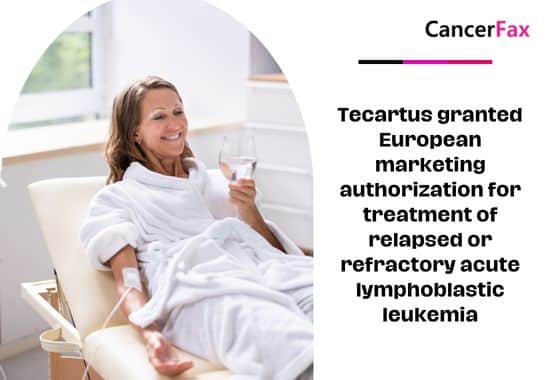Tecartus granted European marketing authorization for treatment of relapsed or refractory acute lymphoblastic leukemia
Sept 2022: The European Commission (EC) has authorized Kite’s CAR T-cell therapy Tecartus® (brexucabtagene autoleucel) for the treatment of adult patients 26 years of age and older with relapsed or refractory (r/r) B-cell precursor acute lymphoblastic leukaemia. Kite is a Gilead Company (Nasdaq: GILD) (ALL).

According to Christi Shaw, CEO of Kite, “With this approval, Tecartus becomes the first and only CAR T-cell therapy recommended for this patient population, addressing a large unmet medical need.” This is also the fourth approved use of Kite cell therapy in Europe, evidencing the advantages they provide to patients, particularly those with few other therapeutic alternatives.
The most prevalent type of ALL, which is an aggressive blood malignancy, is B-cell precursor ALL. Annually, ALL is diagnosed in about 64,000 people worldwide. With the current standard-of-care medications, the median overall survival (OS) for individuals with ALL is just about eight months.
According to Max S. Topp, MD, professor and director of haematology at the University Hospital of Wuerzburg in Germany, “adults with relapsed or refractory ALL frequently undergo multiple treatments, including chemotherapy, targeted therapy, and stem cell transplant, creating a significant burden on a patient’s quality of life.” Patients in Europe today benefit from a significant improvement in care. Durable responses from Tecartus point to the possibility of a long-term remission and a novel treatment strategy.
The ZUMA-3 international multicenter, single-arm, open-label, registrational Phase 1/2 study of adult patients (18 years old) with relapsed or refractory ALL provided the results that supported the approval. With a median follow-up of 26.8 months, this study showed that 71% of the evaluable patients (n=55) experienced complete remission (CR) or CR with partial haematological recovery (CRi).
In a larger data set, the median overall survival for all patients who received key doses (n=78) was more than two years (25.4 months), and for responders, it was nearly four years (47 months) (patients who achieved CR or CRi). The median duration of remission (DOR) among patients whose efficacy could be evaluated was 18.6 months.
The safety outcomes among the patients given Tecartus at the target dose (n=100) were consistent with the drug’s known safety profile. 25% and 32% of patients, respectively, experienced grade 3 or higher cytokine release syndrome (CRS) and neurologic adverse events, which were typically adequately controlled.
Dr. Nishant Mittal is a highly accomplished researcher with over 13 years of experience in the fields of cardiovascular biology and cancer research. His career is marked by significant contributions to stem cell biology, developmental biology, and innovative research techniques.
Research Highlights
Dr. Mittal's research has focused on several key areas:
1) Cardiovascular Development and Regeneration: He studied coronary vessel development and regeneration using zebrafish models1.
2) Cancer Biology: At Dartmouth College, he developed zebrafish models for studying tumor heterogeneity and clonal evolution in pancreatic cancer.
3) Developmental Biology: His doctoral work at Keio University involved identifying and characterizing medaka fish mutants with cardiovascular defects.
4) Stem Cell Research: He investigated the effects of folic acid on mouse embryonic stem cells and worked on cryopreservation techniques for hematopoietic stem cells.
Publications and Presentations
Dr. Mittal has authored several peer-reviewed publications in reputable journals such as Scientific Reports, Cardiovascular Research, and Disease Models & Mechanisms1. He has also presented his research at numerous international conferences, including the Stanford-Weill Cornell Cardiovascular Research Symposium and the Weinstein Cardiovascular Development Conference.
In summary, Dr. Nishant Mittal is a dedicated and accomplished researcher with a strong track record in cardiovascular and cancer biology, demonstrating expertise in various model systems and a commitment to advancing scientific knowledge through innovative research approaches.
- Comments Closed
- September 7th, 2022




Brexucabtagene autoleucel, European Union, Gilead, Kite, Tecartus
CancerFax is the most trusted online platform dedicated to connecting individuals facing advanced-stage cancer with groundbreaking cell therapies.
Send your medical reports and get a free analysis.
🌟 Join us in the fight against cancer! 🌟
Привет,
CancerFax — это самая надежная онлайн-платформа, призванная предоставить людям, столкнувшимся с раком на поздних стадиях, доступ к революционным клеточным методам лечения.
Отправьте свои медицинские заключения и получите бесплатный анализ.
🌟 Присоединяйтесь к нам в борьбе с раком! 🌟